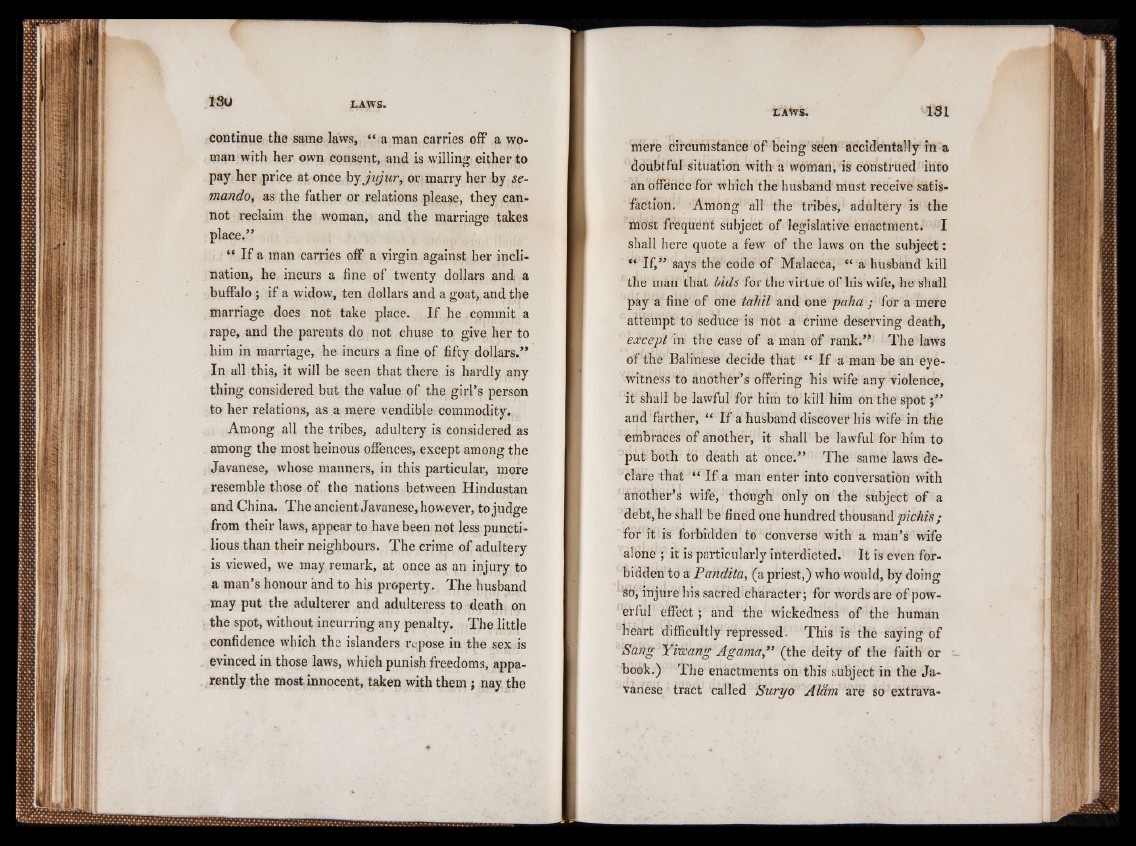
continue the same laws, “ a man carries off a woman
with her own consent, and is willing either to
pay her price at once by jitjur, or marry her by se-
mando, as the father or relations please, they cannot
reclaim the woman, and the marriage takes
place.”
“ If a man carries off a virgin against her inclination,
he incurs a fine of twenty dollars and a
buffalo ; if a widow, ten dollars and a goat, and the
marriage does not take place. If he commit a
rape, and the parents do not chuse to give her to
him in marriage, he incurs a fine of fifty dollars.”
In all this, it will be seen that there is hardly any
thing considered but the value of the girl’s person
to her relations, as a mere vendible commodity.
Among all the tribes, adultery is considered as
among the most heinous offences, except among the
Javanese, whose manners, in this particular, more
resemble those of the nations between Hindustan
and China. The ancient Javanese, however, to judge
from their laws, appear to have been not less punctilious
than their neighbours. The crime of adultery
is viewed, we may remark, at once as an injury to
a man’s honour and to his property. The husband
may put the adulterer and adulteress to death on
the spot, without incurring any penalty. The little
confidence which the islanders repose in the sex is
evinced in those laws, which punish freedoms, apparently
the most innocent, taken with them ; nay the
mere circumstance of being seen accidentally in a
doubtful situation with a woman, is construed into
an offence for which the husband must receive satisfaction.
Among all the tribes, adultery is the
most frequent subject of legislative enactment. I
shall here quote a few of the laws on the subject:
“ If,” says the code of Malacca, “ a husband kill
the man that bids for the virtue of his wife, he shall
pay a fine of one tahil and one paha ; for a mere
attempt to seduce is not a crime deserving death,
except in the case of a man of rank.” The laws
of the Balinese decide that “ If a man be an eyewitness
to another’s offering his wife any violence,
it shall be lawful for him to kill him on the spot;”
and farther, “ If a husband discover his wife in the
embraces of another, it shall be lawful for him to
put both to death at once.” The same laws declare
that “ If a man enter into conversation with
another’s wife, though only on the subject of a
debt, he shall be fined one hundred thousand pichis;
for it is forbidden to converse with a man’s wife
alone ; it is particularly interdicted. It is even forbidden
to a Pandita, (a priest,) who would, by doing
so, injure his sacred character; for words are of powerful
effect; and the wickedness of the human
heart difficultly repressed. This is the saying of
Sang Yizeang Agama,” (the deity of the faith or
book.) The enactments on this subject in the Javanese
tract called Suryo Alam are so extrava